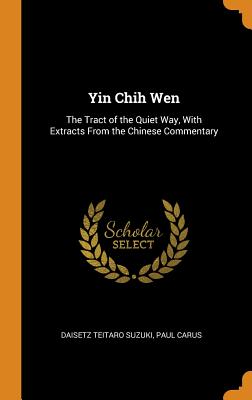

 Franklin Classics Trade Press
Franklin Classics Trade Press
Yin Chih Wen: The Tract of the Quiet Way, with Extracts from the Chinese Commentary


Key Metrics
- Daisetz Teitaro Suzuki
- Franklin Classics Trade Press
- Hardcover
- 9780344264269
- 9.21 X 6.14 X 0.25 inches
- 0.64 pounds
- Philosophy > General
- English
 Secure Transaction
Secure TransactionBook Description
This work has been selected by scholars as being culturally important and is part of the knowledge base of civilization as we know it.
This work is in the public domain in the United States of America, and possibly other nations. Within the United States, you may freely copy and distribute this work, as no entity (individual or corporate) has a copyright on the body of the work.
Scholars believe, and we concur, that this work is important enough to be preserved, reproduced, and made generally available to the public. To ensure a quality reading experience, this work has been proofread and republished using a format that seamlessly blends the original graphical elements with text in an easy-to-read typeface.
We appreciate your support of the preservation process, and thank you for being an important part of keeping this knowledge alive and relevant.
Author Bio
Daisetz Teitaro Suzuki (1870-1966) was a Japanese translator, teacher, and constructive interpreter of Zen Buddhist thought to the West.
Choosing belief over doubt has profound, eternal consequences for practicing Christians, while for religious Jews and Moslems alike, faith in God is the cornerstone of righteousness. Yet elsewhere in the world, revered spiritual traditions exist in which the struggle between belief and unbelief is of little importance. Daisetz Teitaro Suzuki is an eloquent international spokesman for one of these traditions: the Japanese variant of Buddhism known as Zen.
A widely traveled Japanese scholar, Suzuki taught in that country's university system, translated several Eastern philosophical works into English, and corresponded widely with Christian contemplatives such as Thomas Merton. Through his books and lectures, Suzuki became Zen's leading voice in America during the mid-20th century. His Introduction to Zen Buddhism, published in 1956, not only offers an overview of the historical background of Zen philosophy and practice, but succeeds in conveying something of its seemingly inexpressible essence.
Source: Pbs.org and Encyclopedia.com
Videos
No Videos
Community reviews
Write a ReviewNo Community reviews